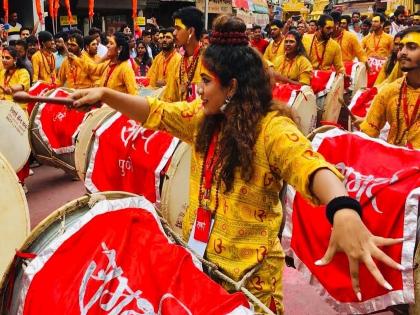Supreme Court Lifts Restrictions on Drum and Cymbal Groups for Ganeshotsav Procession
By Lokmat English Desk | Updated: September 13, 2024 07:31 IST2024-09-13T07:27:24+5:302024-09-13T07:31:04+5:30
The Supreme Court has lifted the restrictions on the number of drum and cymbal groups permitted during the Ganesh ...

Supreme Court Lifts Restrictions on Drum and Cymbal Groups for Ganeshotsav Procession
The Supreme Court has lifted the restrictions on the number of drum and cymbal groups permitted during the Ganesh Chaturthi immersion procession. The easing of these restrictions could potentially extend the duration of the procession. The drum and cymbal groups have welcomed this decision, and Ganeshotsav committees are optimistic that this year’s drumming will be exceptional.
Pune’s Ganesh festival is internationally renowned, with the immersion procession being the highlight of the celebration. The traditional drumming and cymbals are a unique and integral part of this event. However, a previous ruling by the National Green Tribunal (NGT) had limited drum and cymbal groups to a maximum of 30 members. In response, a petition was filed in the Supreme Court.
During a hearing before Chief Justice Dhananjaya Chandrachud and Justices J.B. Pardiwala and Manoj Mishra, the Supreme Court stayed the NGT’s restriction. This decision provides significant relief to the drum and cymbal groups. Initially, the NGT's order, issued on August 30, required the Maharashtra Pollution Control Board to measure real-time noise pollution during the procession. It also mandated that police ensure no more than 30 members per drum and cymbal group, with any violation leading to the seizure of equipment.
Given Pune’s central role in the Ganesh festival, imposing such restrictions was considered inappropriate. The Green Tribunal had not adequately considered the impact, and the Chief Justice’s stay has been met with relief. The drum and cymbal groups plan to present their case further during the next hearing on the 5th of the month. “Noise pollution is primarily caused by DJs, not traditional drums and cymbals. These instruments are a part of our cultural heritage and do not contribute significantly to noise pollution,” said Kunal Ghare, Social Activist.
Open in app